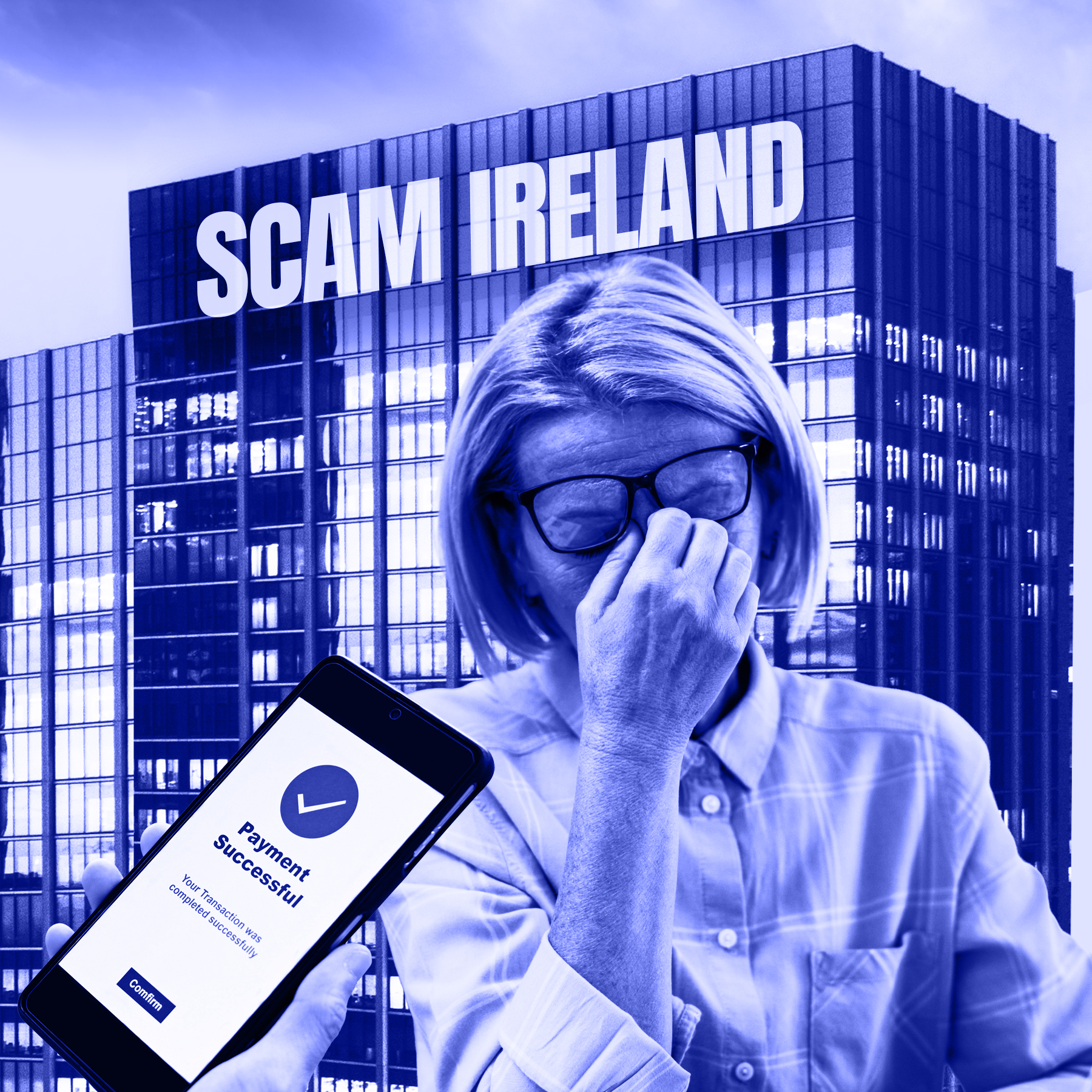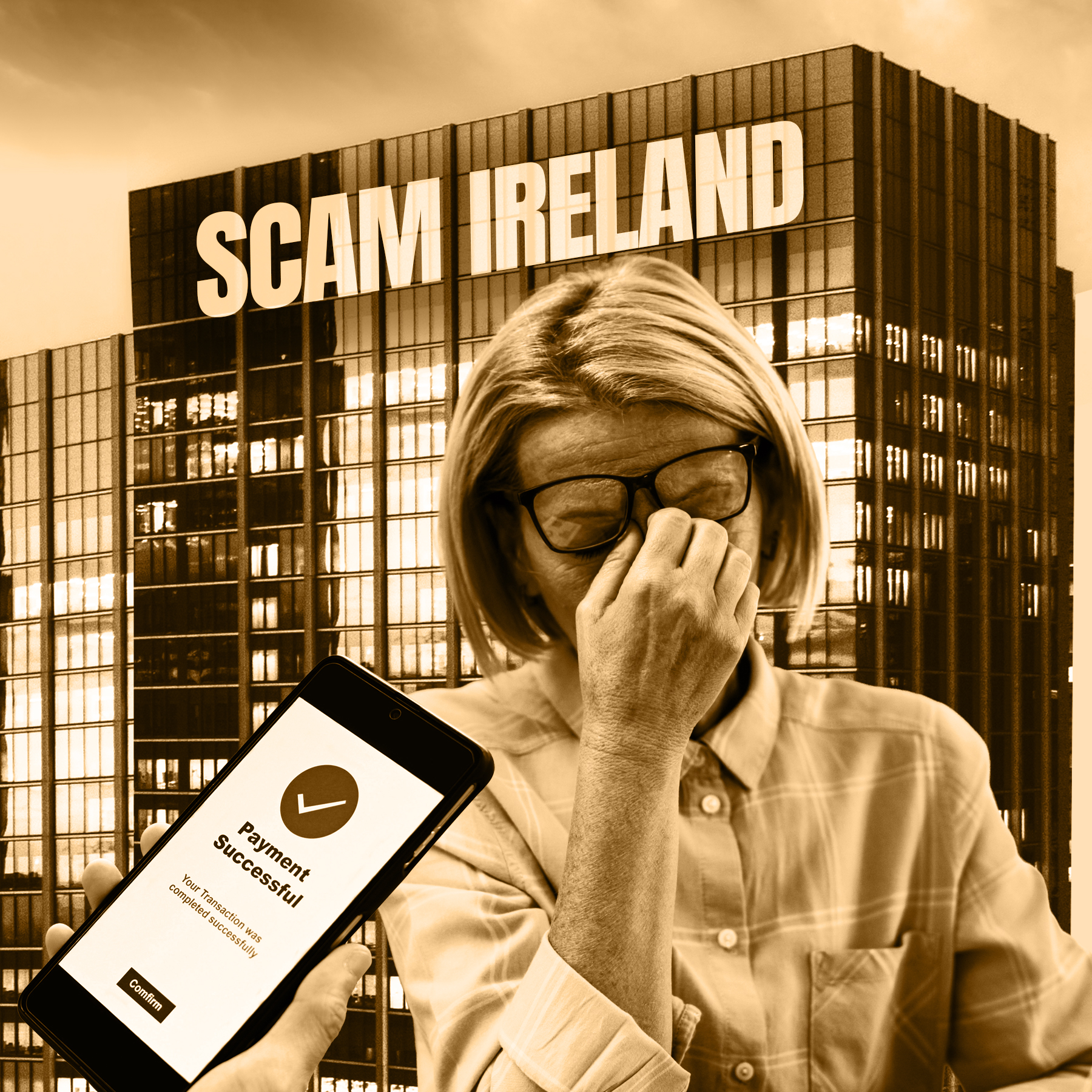“I’m a little nervous,” the Dublin-based diplomat told the man on the other end of the phone calling himself “Jonathan”.
“Nervous is good,” Jonathan replied, reassuring him. “It means new things are happening. It’s like having a baby.”
By this stage, the diplomat had spent several hours on the phone with Jonathan and was at ease in his company. They shared jokes and complaints about work.
“I’m so busy – it’s just delegation after delegation,” the diplomat complained during one call.
READ MORE
Jonathan first started calling in July 2023 after the diplomat clicked on an online advertisement offering a passive income through a new type of high-speed stock trading. He said he was from a company called Golden Currencies and based in the UK.
“I was assigned as your financial adviser and I’m here to help you make as much as you can,” he told him.
The diplomat started with a €250 investment and soon started seeing gains. On the Golden Currencies website he could see profit of €83.66 one day and €61.10 the next.
But he had no idea at this stage that he was dealing with a sophisticated investment scam operation and that this money was gone as soon as he handed it over.
Recordings of his calls with the scammer – obtained by The Irish Times as a result of a leak to journalists – show the diplomat to be personable and friendly.
Throughout more than 120 calls, the diplomat shares his weekend plans and news about his family. He appears to have some basic knowledge of trading in shares.
The diplomat’s phone number is recognisable on the records of the scamming operation as an Irish mobile number. The Irish Times has established that he lives on the southside of Dublin, is an Irish citizen and works for the embassy of an African country.
Soon after Jonathan was pushing him to invest more money.
But time was of the essence; the diplomat only had a small window to take advantage of market conditions, he was told.
Within a week he had handed over another €4,047. By the end of the month, he had given Jonathan €8,120. By December he had paid €31,058 in total.
Whenever making another investment, the diplomat was told to first transfer the money from his bank into a cryptocurrency wallet Jonathan had helped him set up.
Jonathan advised the diplomat he may get a call from his bank asking what all these payments were for. He should tell the bank they were payments to a personnel account card and that was none of their business.
“The banks are greedy, they just want the investment business themselves,” Jonathan said.
In return, Golden Currencies soon showed him huge returns. Whenever the diplomat logged into the company’s website, he saw the money in his account had grown by thousands. It was almost too good to be true.
Sometimes, during his many conversations with Jonathan and other Golden Currencies agents, the diplomat worried about meeting his next mortgage payment.
Jonathan advised him not to fret. The money he invested was completely insured.
On one occasion, when the diplomat did not have money for a fresh investment, Jonathan remotely logged on to his computer and helped him apply for a loan from Bank of Ireland.
Sometimes it was Jonathan who called; on other occasions it was a person named “Eric Hill” or “Lucas Hoffman”, though these were not their real names.
All three poured on the flattery: “You are the big guy there. Almost like a CEO,” one caller told the diplomat about his work at the Dublin-based embassy.
Any doubts the diplomat had were quickly assuaged. Once, the diplomat said he was a Muslim and therefore not allowed make money from interest. The profits from his trading did not count as interest, he was told.
Did the company have any links to Israel, he asked on another occasion. None whatsoever, he was assured.
In one call, the diplomat complained to Jonathan that scammers called him and tried to get him to invest but that he saw through them.
“Oh my God, those people,” Jonathan said without missing a beat. “It’s crazy those people exist. Someone has to be extremely unintelligent to believe their lies.”
By the end of the year, the diplomat was starting to realise something was wrong. He wanted to cash out his investments in addition to the €28,000 he was told he had made in profit.
That’s no problem, Eric told him. He just had to pay €3,970 in fees first. Why couldn’t Golden Currencies take that out of his earnings, the diplomat asked.
“We can’t do that because we don’t hold it. It’s on the blockchain,” Eric replied, referring to a type of technology that’s often used to support cryptocurrencies.
The diplomat refused to pay the money. A few weeks later, he received another call saying he just had to pay €2,600 to recover his money.
By that stage he had spent more than 25 hours on the phone with Golden Currencies.
The diplomat stopped answering the phone. The few times he did, he sounded dejected and told them to call back later.
It was clear from the calls he had realised his money – all of it – was gone.
That was the end of the matter until August 2024 – a year after Jonathan first called – the diplomat received a call from a new number. The caller said his name was “Roy Pierce”, that he was from a financial services agency and that he had good news.
Golden Currencies had been shut down and its funds frozen. Roy told him he could help the diplomat recover all his money and maybe even the “profit” he made. He just needed to answer a few questions and then open another cryptocurrency wallet.
The diplomat hung up.
It is possible he realised then that the call was coming from the same location as Golden Currencies, which was – in fact – an anonymous office on Kavtaradze Street in Tbilisi, Georgia.
Georgia and Serbia
The diplomat is not the usual victim of investment scams. That is because there is no usual victim.
Using vast amounts of leaked documents, The Irish Times, working with the journalism consortiums Investigate Europe, the Organised Crime and Corruption Reporting Project (OCCRP) and the Balkan Investigative Report Network (BIRN), has identified hundreds of Irish victims of investment frauds carried out by two scam call centres in Georgia and Serbia.
The victims differ significantly in background, wealth and experience and include doctors, tech experts and accountants.
Some, like the diplomat, even had previous experience in the legitimate investment market.
Victims also differed in how much they lost to the scammers.
Film worker Simon Willis spoke to The Irish Times and shared his experiences of being scammed; he lost just his initial €250 investment to the Georgian scammers before realising something was off.

Scam call centre agent 'Josh' begins to lure Simon Willis in by showing him modest gains on his initial investment of €250

'Josh' explains that Simon Willis must pay 'commission' before withdrawing funds
IT worker Vlad, who asked that only his first name be published, said he lost €5,250 to the Serbian-based operation and is still trying unsuccessfully to recover his money.
The investigation by the network of journalists consists of two components: one is based on a leak provided to the OCCRP from the Georgian call centre made up of 1.9 terabytes of digital data – the equivalent to about 2,000 hours of video or about 600,000 photos. This includes internal financial documents, staff training material and, crucially, recordings of more than one million calls with potential victims between May 2022 and February 2025.
Just more than 11,000 calls were made to Irish numbers, making Ireland the 10th-most popular target country globally for the scam callers.
Of these, the scammers ensnared 31 Irish victims who lost a combined total of €299,135 between them.
One victim, a woman from Dublin, gave them €32,000 in eight transactions, according to a spreadsheet held by the Georgian scam operation, obtained in the leak.
Another Irish victim, a man in his 70s, lost just under €62,000 in eight transactions over a two-month period in 2024.
Worldwide, the Georgian call centre made €30.5 million from 6,179 “clients” – as the centre calls them – during the 2½-year period.
There were 170 Irish victims of the Serbian call centre, which was based in Belgrade’s business district, the leaked data shows. There, it shared an office building with a Chinese cultural complex and an upscale hotel.
Before it was raided by Serbian police in January 2023 as part of a wide-ranging operation by the European Union’s law enforcement agency Europol, it formed part of a network of scam operations based in Serbia, Bulgaria, and Cyprus that was linked a wealthy Israeli businessman.
Europol stated the Serbian operation is believed to have targeted more than 70,000 people worldwide and to have brought in an estimated €250 million through investment scams.
The ‘skameri’
There is no evidence connecting the Georgian and Serbian operations to each other. But the leaked data shows they operate in remarkably similar ways.
By almost every measure, the operations appear more like legitimate sales businesses than a criminal enterprise.
“The offices were completely normal like any other corporate office – plenty of desks, chairs and computers,” says Boris Majlat, head of the Serbian High Tech Crime department that raided the Serbian operation in 2023.
Inside, staff manned different desks dedicated to targeting specific language groups. The English desk adopted English-sounding names and identities, and targeted victims in Ireland, the UK and Canada while the French desk handled France, Belgium, the Netherlands and Luxembourg.
Files from the Tbilisi operation show it was structured like any other call centre. There was a human resources department, performance evaluations and office parties. The operation’s 85 staff shared memes and gifs through internal chats and talked about which bar they would go to at the end of the day. They also had a nickname for themselves: “the skameri” – Georgian for scammers.
[ ‘Cybercriminals are leveraging AI to craft highly realistic scams’Opens in new window ]
Except, unlike other call centre workers in Georgia, where the average wage is €650, some staff were making more than €17,000 a month. Many were not shy about flaunting this wealth. The investigation identified social media posts by various scammers showing off their Rolex watches, designer handbags and high-end Range Rovers.
There are also other perks available in these centres.
“For example, you were never paying for lunch. We had rooms with PlayStation, with ping pong table. We were having Fun Fridays with pizza, sushi, drinks, bartender coming in at least every month,” said Khatia (not her real name), a former scam call centre worker who was employed at a different operation in Georgia.
These operations are enabled by an array of companies providing marketing, payment services and software support. Some don’t know they are enabling fraud; others don’t care.
The Serbian and Georgian operations took in staggering amounts of money. But they formed just a small part of the vast global scam investment trade.
According to Europol, the scale of the problem is growing at a staggering rate. Globally, the financial scam industry siphoned away more than €1 trillion in 2023, with only 4 per cent of victims recovering their losses, according to estimates from the Global Anti-Scam Alliance, a non-profit organisation.
This trend is reflected in Irish crime figures. Last year almost €31 million was reported stolen in Ireland through investment fraud, up from €14 million in 2021.
The problem is worsening at an accelerating rate. In the last three months alone, investment fraud reports to the Garda have increased by 21 per cent. Overall, fraud offences have increased by 73 per cent since last year.
The hook
The “opportunities” offered by these call centres appear complicated at first. One involves “quantum trading” where artificial intelligence (AI) makes thousands of trades a second on behalf of investors.
Another involves investing in Chinese bitcoin-mining operations. But pare back the sales pitch and they are all very similar. A victim invests a sum of money and a fake website shows them their investment is growing daily. But in reality, the money is gone as soon as it is sent.
They also start the same way: with a single click on an ad. These ads are created by marketing companies and tailored for individual markets.
Willis, the film worker, was taken in by a fake ad purporting to show Brian Dowling, the Irish celebrity and TV and radio presenter, demonstrating live on air how to turn €250 into €2,000 in seconds.
For Vlad, the tech worker, it was an uncannily realistic AI version of Elon Musk.
Maria*, who works in marketing, was taken in by a fake news article about cryptocurrency.
“There were lots of comments under it saying: ‘Oh, my God, this really works,’” she told The Irish Times.
“At the time everyone was starting to talk about Bitcoin ... so there was a bit of Fomo [fear of missing out].”

Scammer 'Kate' tells Simon Willis he will have to pay $4,000 to access his 'earnings'

Simon Willis confronts scammer 'Josh' over fake image
The ads change regularly to avoid moderation efforts by social media companies. They also respond to current events.
One of the latest features an AI version of presidential candidate Heather Humphreys launching an investment scheme allowing people to earn €4,500 “with minimal investment”. The AI captures her facial expressions and distinctive Monaghan accent almost flawlessly.
Once clicking through, users are asked to enter some basic contact information. This is then sold to scam call centres as sales leads.
The cost of each lead depends on the GDP of the victims’ country. Irish victims are high-value targets. Leads from Ireland are among the most expensive, usually going for just more than €1,100 each, just below victims from the Nordic countries, Australia, Belgium and the Netherlands.
The first scam call the victim receives is from a member of the “conversion” team, a junior staff member who evaluates the wealth of the victim.
They follow a strict script. According to training material obtained from the Georgia leak, they are instructed to ask the client what they do would with $10,000. The scammers role-play this repeatedly before taking on live clients.
They also play the “objection” game, where they practise countering victim’s explanations for not putting in more money. One of the most important questions they ask is the citizenship of the victim. Americans are to be avoided; the FBI is too proactive in this area.
Once the victim is hooked, they are told their “financial adviser” will be contacting them soon. This person is pitched as a highly experienced trader who, having made large sums on the market themselves, is dedicated to showing others how to become wealthy.
Pressure starts
The job of the conversion team is to “sell the senior”, according to the training material. In other words, prime the customer for a call from a member of the call centre’s “retention team”. These are more senior scammers who have become adept at building up a rapport with victims and persuading them to part with larger and larger sums.
“We had a speech which was scripted, but a lot depended on how good you could actually improvise. And in order to make someone actually invest and put money into it, you actually needed to be a better listener than speaker, because you needed to listen to what people are looking for,” said Khatia, the former scam call centre work in Georgia.
“People love to talk about themselves. And if you’re just going to let them, they will spill all the tea.”
If there’s pushback, they’re trained to encourage the victim to empty their savings accounts, secure a bank loan or ask friends and family for money.
When one victim, a Norwegian retired journalist named Annika Gustafson, told her scammer in the Georgian operation she was considering suicide after paying over thousands, he replied: “Suicide is not going to be returning your money”, before encouraging her to borrow more from friends.
Sometimes the scammers let their victims withdraw a small amount of their “earnings” to keep them on the hook. This is what happened to Vlad, the Dublin-based IT worker who lost €5,250 to the Serbian operation.
“I was suspicious for a long time but not 100 per cent sure because I was once able to transfer a little bit of the money to my account. So I knew it was possible. But when I tried to transfer the final amount, it got stuck in some money buffer crypto wallet or something.”
When victims finally insist on withdrawing their money, they are told they must pay commission and fees before it can be released. When Willis, the film worker from south Dublin, wanted to withdraw his supposed €23,000 in earnings, he was told he had to pay €4,000 in fees to a cryptocurrency company.
Already highly suspicious, he then realised he was being scammed.
He had carried out a reverse image search on the photograph his “financial adviser” George had sent him and found it was a stock image.
“I decided to have some fun with them. I was just walking around my garden leading them on. I wanted to get some value out of my €250,” he recalled.
“This is a scam George,” Willis told him on their last call on June 18th, 2024. “You haven’t given my anything, just dreams.”
George became impatient, at first mocking Willis for only investing €250, then telling him he knows nothing about the markets.

Simon Willis confronts scammer 'George'
“You don’t know how to work with crypto. You don’t know nothing about it. So, you can’t tell that you’ve been scammed,” George told him.
Willis ended the call with some choice language.
How do the call centre workers, many of whom are young college students, justify this work?
“One of the strongest ideas, which basically everyone was holding into, was that nobody was making them deposit this money, you know, like no one was forced. It wasn’t an aggressive sale. They could hang up any given moment,” said Khatia, the ex-scammer.
Many of the victims are either “desperate” or gamblers, she said.
Khatia described one victim who said he was trying to get money to help his sick mother. One of her fellow scammers took pity on him and told him to walk away.
The victim thanked them and hung up, she said. The next morning, he called back and made another deposit.
Recovery room
Despite their smooth sales pitches and skill for social engineering, the scammers often lose their cool when a victim is getting away.
“You will never see [your money] again”, one Georgia-based scammer told her victim. When the victim said he was going to take his own life, she told him: “Just go ahead and kill yourself.”
In the background, the scammers often insulted their victims, internal records from the Georgia operation show.
“Family full of d**kheads,” a scammer calling himself Anthony wrote about a target.
“She is a f**king b***h ... said that doesn’t want calls every month ... thinks that I’m gonna trade for her like a slave,” he wrote of another victim.
In one case, he prank-called a man who had caught on to the scam, claiming to be a delivery man bringing a sex toy to his wife.
Once the retention team has finished with the victim, they are passed on to the last phase of the scam, the recovery room. Victims receive a call from someone claiming to be from a police force, a financial regulator or a financial services firm.
The scammers have been shut down and the assets frozen, the victims are told.
All the victims have to do is pay a small administrative fee, usually a percentage of their investment, to retrieve their money.
Vlad, the IT worker, is currently on this stage of the scam. He knows he has been the victim of a fraud. But he still holds out hope there is a slim chance his €5,250 is recoverable somehow.
“My hope is someone closes them down and ... investigations might retrieve money for people, including me. I don’t give it a big chance but you never know.”
On July 27th, 2024, Rachel*, an Irish nurse and grandmother, lost €10,800 to the Georgian scam centre, the leaked data shows.
The records show she received a call from someone claiming to be from the Securities and Exchange Commission (SEC), a US federal agency that investigates financial fraud.
“Unfortunately, you’re not the first [victim] and you’re not the last one,” the fake SEC agent told the nurse, according to an audio recording of their call. “I have pensioners, retired people who had lost all their life savings.”
Rachel sounded utterly defeated.
“I hoping after this phone call I won’t receive any more phone calls. Because my heart is just broken.” The fake agent seemed to take pity on Rachel and hung up without completing the scam.
Susan*, another Irish nurse, had a similar reaction after giving the Georgian scammers almost €8,000.
“This has all been a scam. I’m just going to have to swallow that bitter pill,” she told her recovery room scammer in March 2024, according to an audio recording of their call obtained in the leaked data.
“I’ll have to tell my husband I’ve lost all our money.”
Susan and Rachel did not respond to The Irish Times when comment was sought.
Investigations
The Serbia operation shut down after the police raid in 2023 and 21 people are now facing prosecution.
However, no one has been convicted and the suspected controllers of the fraud remain at large.
The Georgian centre shut down operations after the leaked data was made public last March.
The Georgian police announced an investigation into the AK group, the suspected operators of the centre, for alleged fraud and money laundering.
AK Group did not respond to requests for comment from the OCCRP.
The authorities also froze the assets of six scammers exposed by reporters. However, within a month, the data shows many of the scammers were already back at work.
*Some names have been changed to protect victims’ privacy
* Co-author of this report Mei-Ling McNamara is the editorial director of Investigate Europe
- You can share your experience of being scammed using the form below.


















